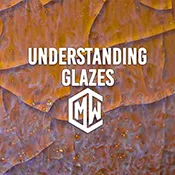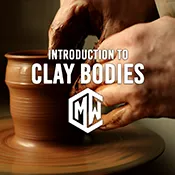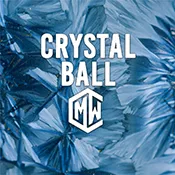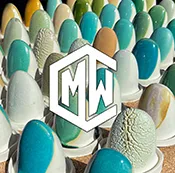You have made the decision that you want to save money and have more control over your making process by learning how to make your own ceramic glazes. Now what? How do you get started?
Before selecting a glaze class, it’s important to consider a few things first. How do you want to learn? Do you want to take an in-person or online course? How much time can you devote to the course? When do you want to start? What is the cost? Do you want to do it by yourself or do you want to interact with the instructor and other students?
Once you’ve answered these basic questions, you can start looking at options that fit your criteria. To help, we’ve compiled a list of some places to start:
Local Pottery Studios and Community Centers:
Many local pottery studios and community centers offer ceramics classes that include glaze making. These classes are often suitable for beginners or those looking to expand their knowledge in a hands-on, interactive setting or for those just getting started mixing their own glazes. Course options, however, can be limited based on location and instructor availability. Cost is determined by the studio and can vary based on the level of the course.
Ceramics Programs at Universities or Colleges:
If you’re looking for a more comprehensive and in-depth glaze chemistry education, consider enrolling in (or auditing) classes offered as part of a ceramics program at your local university or college. Many ceramic programs often include dedicated glaze chemistry courses as part of their curriculum. They provide a structured learning environment with access to knowledgeable instructors, well-equipped facilities, and a community of ceramic artists. Again, course options can be limited based on location and instructor availability, plus cost can be prohibitive (part-time cost can be over $1,000 per credit hour). Students are also limited to certain start dates as traditional semester courses typically begin either in the fall or spring.
Online Courses and Workshops:
Online platforms that specialize in glaze chemistry courses and workshops typically offer a range of courses from beginner-level introductory to more advanced. Learning online provides a lot of flexibility in terms of start date (can be immediate), time to take the course (you can log in on your own schedule), and location (it doesn’t matter where you live). Many online courses include recorded lectures, which are a great advantage if students want to rewatch the material. Some online options also offer lifetime access to course materials or have options to continue access past the course end date. Costs can vary based on the type of course. Look for a reputable platform that offers comprehensive glaze chemistry education with different course options.
Ceramic Conferences and Symposiums:
Attend ceramic conferences, symposiums, or workshops where glaze chemistry is a part of the program. These events often feature expert speakers, demonstrations, and hands-on activities related to glaze formulation and chemistry. It’s an excellent opportunity to learn from experienced professionals, network with other ceramic artists, and stay updated on the latest developments in the field.
Books and Educational Resources:
If you prefer books, there are many educational resources available that cover glaze chemistry. Look for authors and publications that provide comprehensive information. Many can be just pictures of glazes and formulas that do not cover the chemistry behind glazes. Some popular glaze chemistry books include Cushing’s Handbook by Val Cushing, Clay and Glazes for the Potter by Daniel Rhodes, and The Potter’s Dictionary of Materials and Techniques by Frank and Janet Hamer. Books are great options for self-guided study, but they do not allow you to ask questions about the content. Cost can also add up quickly if you decide to purchase multiple resources.
Again, it is important to consider your learning style, schedule, and budget when choosing a glaze chemistry class. It is often beneficial to start with introductory workshop courses and then progress to more advanced topics as you gain confidence and experience. Remember to seek out reputable companies and instructors to ensure you receive accurate and reliable information.
Note: Since we are an online ceramics education company, we are obviously biased, but we get a lot of emails asking how to get started making glazes, so we wrote this blog article to help guide members of our community to think about the best option for them. We think online is a great option and offer many different options for ceramists of all levels! 😀 You can check out our course options here.









